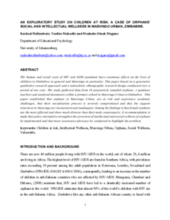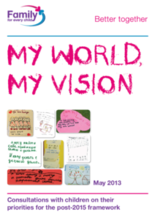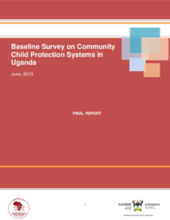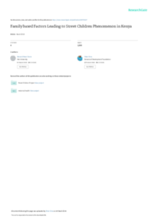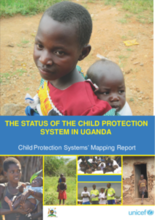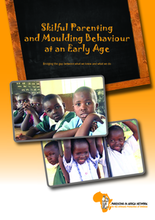Displaying 501 - 510 of 665
The study gathered data from 16 purposively sampled orphans, 4 guidance teachers and analysed documents within a primary school in Masvingo Urban in Zimbabwe.
The Millennium Development Goals will come to an end in 2015 and discussions are currently taking place on what framework will replace them. Children’s participation is crucial to these discussions. Between July 2012 and March 2013, members of Family for Every Child consulted with children living in seven different countries. This report summarizes the main findings that emerged from these consultations.
This report describes the process, findings and recommendations of the baseline survey for the project titled, “Building and Strengthening Community-Based Child Protection Systems in Busoga and Acholi sub-regions” commissioned by ANPPCAN. The baseline survey was intended to establish the status of project indicators so that the information obtained can inform the implementation of project activities.
The primary goal of this research was to examine whether Malawi Social Cash Transfer Pilot Scheme, initially implemented in a rural district in central Malawi, improved health outcomes for children aged 6–17.
This paper is a culmination of various studies carried out by the authors and other researchers and seeks to specifically interrogate factors in the family system in Kenya, which contributes to children leaving homes to live on the streets.
This mapping process was commissioned by the Ministry of Gender, Labour and Social Development in order to facilitate the transitioning of Uganda’s approach to child protection from a disjointed, issue-based and project-oriented approach to a more system-oriented approach in order to respond effectively to the multi-dimensional and complex child protection needs of all children in the country.
This is an impact evaluation of New Generation, a three-year project comprised of two components: 1) A VSLA intervention involving the establishment of Village Savings and Loan Associations (VSLAs) and the provision of entrepreneurs
Using data from three rounds of the Young Lives longitudinal survey conducted in 2002, 2006, and 2009 in Ethiopia, this paper investigates whether the death of a parent during middle childhood has different effects on a child’s schooling and psychosocial outcomes when compared with death during adolescence.
This new study by Parenting in Africa Network (PAN) was conducted in three regions in Kenya (Nairobi, Mombasa and Busia), involving primary care givers of children age 0-8, children participating in Early Childhood Development and Education centers, and stakeholders and professionals involved in skillful parenting and early childhood development.
This study aims to determine the prevalence of maltreatment experienced by institutionalized children prior to their admission to Charitable Children's Institutions (orphanages) in western Kenya, and to describe their socio-demographic characteristics, reasons for admission, and the factors associated with prior experiences of maltreatment.

